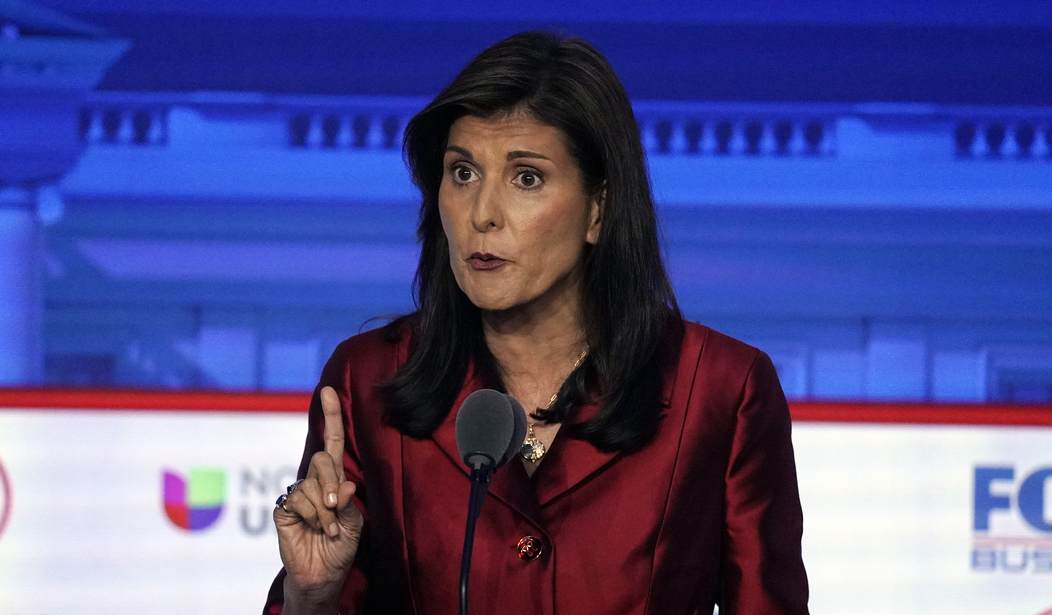Former South Carolina Gov. Nikki Haley just lost the New Hampshire primary by 11 percent.
She had earlier come in third in the recent Iowa caucuses behind Florida Gov. Ron DeSantis. But DeSantis, not she, dropped out of the race. He then endorsed front-runner Donald Trump.
By contrast, Haley confidently announced that at last there was a two-person, head-to-head race. So she confidently headed to New Hampshire.
Her subtext was that if she did not win the upcoming two-person primaries, she would come in "second" rather than "last."
Her supporters outspent all the candidates in Iowa and would do so again in New Hampshire. Haley consolidated the Never-Trump voters, won Independents and crossover Democrats, and garnered millions from the donor class exasperated at the thought of a third Trump candidacy.
Moreover, nearly half of those who voted in the Republican primary were not themselves Republicans. New Hampshire was the most Haley-friendly primary in the entire campaign season.
Yet after coming in last in the three-person Iowa race with 19 percent of the vote, she still lost by 11 points in a New England state more reflective of a traditional Romney or Bush voter than of a Trump supporter.
Trump has now won the first two primaries by large majorities. As he reminds us, no Republican in recent history has lost the nomination after winning Iowa and New Hampshire.
So what is Haley's strategy ahead?
In the short term, she will cede to Trump the Nevada caucuses and focus on her home state of South Carolina.
But then what?
DeSantis wisely got out of the race and endorsed Trump because he did not wish to lose in New Hampshire. And he correctly surmised that he will be a frontline candidate in 2028, with a now-supportive Trump.
Recommended
By contrast, Haley, after losing Iowa, New Hampshire, and Nevada, may lose her native state even more dramatically, despite her longed-for head-to-head race with Trump.
Will Haley thereby tarnish her long-term political viability? Who knows? But party pressure will only increase for her to drop out, seek unity in the party, and consolidate finite Republican donor funds behind Trump.
In sum, Haley now has four choices.
First, she can exit, endorse Trump, promise to campaign for him with Independents and cross-over voters, and expect an offer of a cabinet position or ambassadorship as she prepares to run again in 2028.
Or second, Haley can campaign even harder. She can raise lots more Never-Trump money and mimic George H.W. Bush's second-place, year-long candidacy of 1980.
Even when losing, Bush tempered his attacks on front-runner Ronald Reagan. Meanwhile, he proved himself an adroit campaigner, consolidating a coalition of anti-Reagan establishment Republicans and independents in the primaries.
The advantages of Bush's hard campaigning and appeal to centrists finally impressed Reagan realists.
Bush himself won over a hesitant Reagan to the once unthinkable idea of putting the aristocratic blue blood on the ticket as a balance to the supposedly hard-right Reagan.
The ensuing Reagan-Bush ticket smashed incumbent President Jimmy Carter.
Eight years later, Bush himself was rewarded by being nominated without much opposition in the primaries, endorsed by President Reagan, and winning the presidency in 1988.
Haley might do the same, moderating her attacks on front-runner Trump as she plays the noble opponent for a few more primaries.
That way, she might angle for the vice president nomination, promising to deliver millions of centrist voters.
Such service would also boost her profile in a final four-year Trump administration and position her well for 2028.
Or third, Haley can limp about for a few more primaries, haphazardly campaign, and slowly fizzle out. That rope-a-dope strategy would be to remain a "backup" candidate.
An inert Haley would serve as the only remaining Republican alternative to Trump -- on the chance he might be convicted and jailed and thus either be unable to actively campaign or wounded as the first felon to run as a major party candidate.
Or fourth, Haley can go the full-bore, dead-ender route.
She would ratchet up her harsh attacks on Trump's age and emulate the 2016 Never Trump nihilism.
Haley could not win. But she could hurt Trump in the manner that the Never Trump vote wounded Trump in 2016 and might even have helped defeat him in 2020.
Haley would win accolades from the media, be canonized (for a while) by Democrats and Never Trumpers as a brave maverick speaking truth to power --and essentially blow up her political career.
Choice one, the DeSantis route, is the most logical. But Haley might well choose the riskier options two and three of staying in the race.
Option four would end her career, delight an ailing Biden campaign, and could give the country more of the 2021-24 madness rather than a return to what worked in 2017-20.
Victor Davis Hanson is a distinguished fellow of the Center for American Greatness. He is a classicist and historian at the Hoover Institution, Stanford University, and the author of "The Second World Wars: How the First Global Conflict Was Fought and Won," from Basic Books. You can reach him by e-mailing authorvdh@gmail.com.
























Join the conversation as a VIP Member